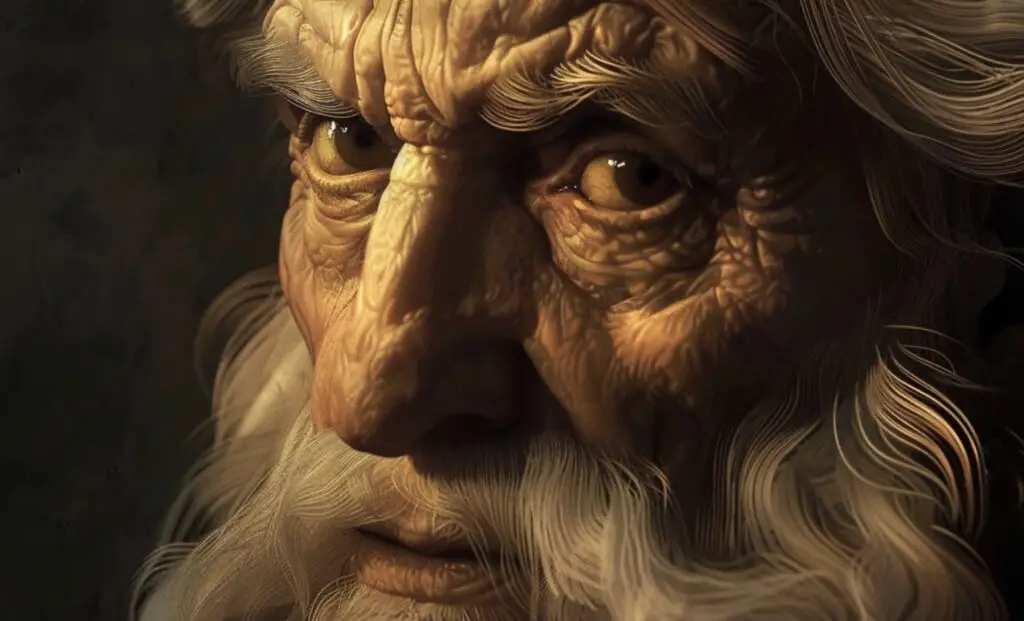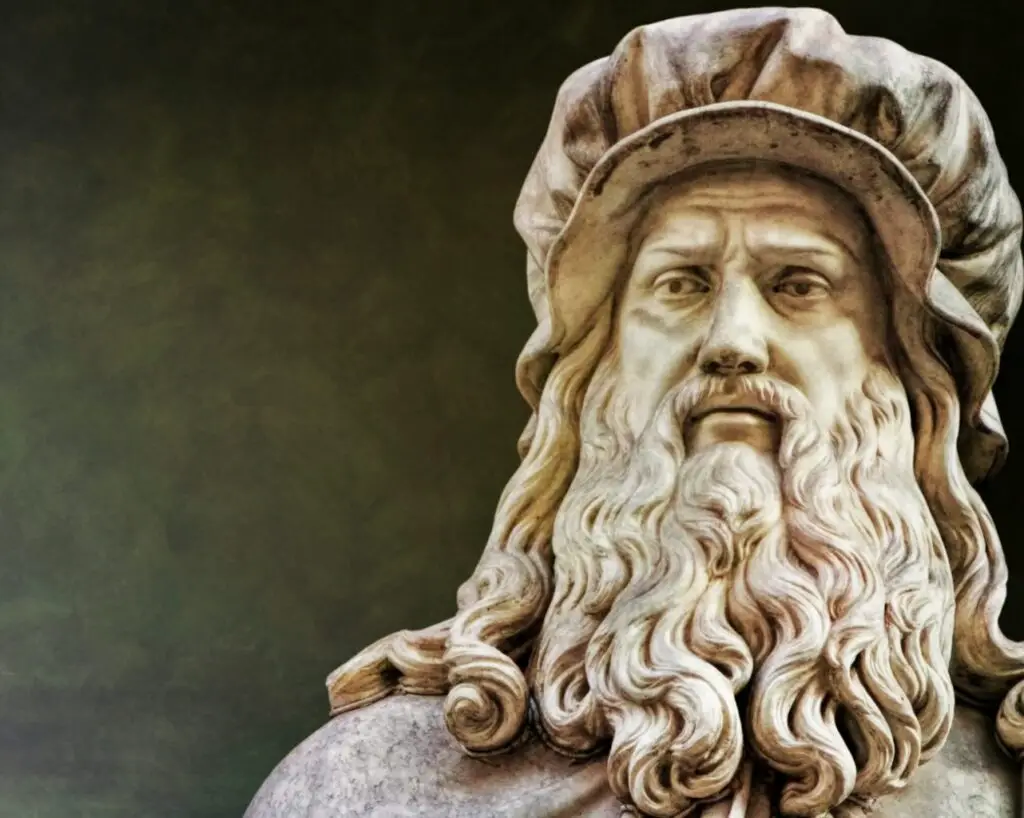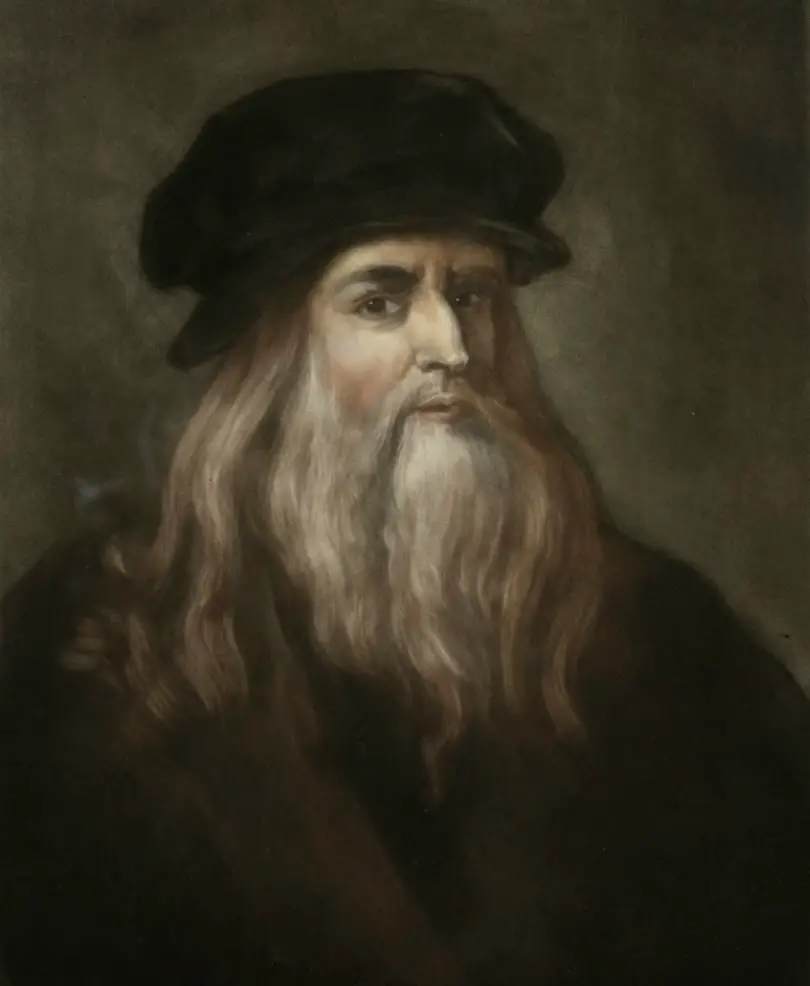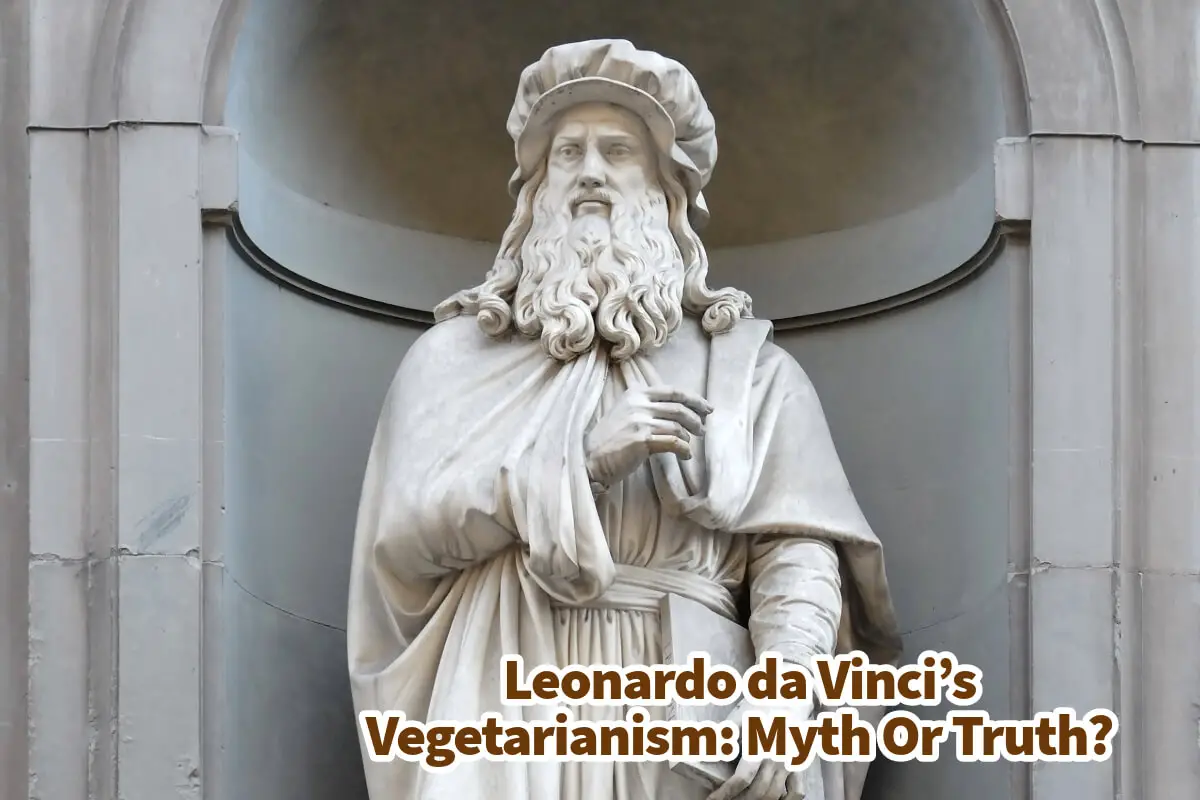Leonardo da Vinci (April 15, 1452 – May 2, 1519) is universally recognized as one of the greatest minds of the Renaissance. Known for his unparalleled contributions to art, science, anatomy, engineering, and a vast array of other fields, da Vinci epitomized the “Renaissance Man.”
But beyond his well-documented achievements, one aspect of his life intrigues scholars and enthusiasts: his diet. Specifically, claims have long circulated that Leonardo da Vinci was a vegetarian. The idea of Leonardo adhering to a meat-free diet has captivated the imagination of many, painting a picture of a man who was not only ahead of his time intellectually but also ethically in his treatment of animals. However, like many aspects of Leonardo’s life, separating fact from myth is no simple task.
Table of Contents
- The Renaissance Context: Vegetarianism In The 15th Century
- Leonardo’s Love For Animals
- Evidence From Leonardo’s Writings
- Cultural Associations And Philosophical Influences
- Leonardo’s Health And The Influence Of His Diet
- Myth Or Truth: Was Leonardo Truly A Vegetarian?
- The Legacy Of Leonardo’s Alleged Vegetarianism
- Related Questions
Read on as delves into the historical claims surrounding Leonardo’s vegetarianism, examines the evidence from his writings, and explores the broader cultural context of the Renaissance to determine whether Leonardo da Vinci was indeed a vegetarian or if this belief is merely a romanticized myth.

The Renaissance Context: Vegetarianism In The 15th Century
Before delving into Leonardo’s diet, it’s essential to understand his time’s cultural and societal norms. During the Renaissance, the concept of vegetarianism as we understand it today was not widespread.
Most European people ate meat when they could afford it, though their diet was plant-based, mainly due to economic constraints rather than ethical choices.
Meat was often seen as a symbol of wealth and prosperity, and for the upper classes, it was an essential part of feasts and banquets.
Philosophical And Religious Traditions That Advocated Abstaining From Meat
However, some philosophical and religious traditions, including certain sects of Christianity, Platonism, and Pythagoreanism, advocated abstention from meat. These groups often believed that a vegetarian diet was purer and aligned more closely with spiritual principles.
The Pythagorean tradition, which focused on harmony with nature and the belief in the transmigration of souls, was sometimes invoked by Renaissance humanists, who revived classical ideas and integrated them with Christian teachings.
Thus, while vegetarianism was not common during Leonardo’s time, it was not entirely unheard of, especially among intellectuals and those who adhered to specific philosophical doctrines.
Leonardo’s Love For Animals
One of the strongest arguments favoring the claim that Leonardo da Vinci was a vegetarian is his well-documented love and respect for animals.
Leonardo’s writings are filled with musings on nature, and his profound admiration for the animal kingdom is evident. He often sketched animals with a tenderness and understanding that was rare for his time.
Some anecdotes suggest Leonardo purchased birds in the marketplace only to set them free, a testament to his compassion for living creatures.
Buying caged birds to release them speaks to his sensitivity toward animal suffering. In an era when animals were primarily viewed as resources for human consumption, Leonardo’s actions would have been considered unusual and perhaps even eccentric.
In his notebooks, Leonardo wrote:
“The time will come when men such as I will look on the murder of animals as they now look on the murder of men.”
Leonardo da Vinci
While this quote is often cited as evidence of his vegetarianism, it is worth noting that this sentiment aligns more closely with his philosophical views on the sanctity of life than with a specific dietary restriction.

Evidence From Leonardo’s Writings
Although Leonardo’s notebooks are filled with insights into his thoughts on various subjects, there is no direct and explicit reference to his vegetarianism.
Unlike contemporary thinkers who documented their dietary choices as part of their philosophy, Leonardo does not seem to have written extensively about his eating habits.
This absence of a clear statement on vegetarianism has led to significant debate among scholars regarding the validity of claims that he abstained from eating meat.
However, indirect clues suggest Leonardo may have chosen to avoid meat. One of his more famous statements is:
Leonardo da Vinci
“I have from an early age abjured the use of meat.”
While widely circulated, this line has not been definitively traced to Leonardo’s original manuscripts, and its authenticity remains questioned. If true, it would be a direct admission of his dietary preference. Still, given the lack of corroborating evidence from his other writings, treating this statement as conclusive proof is difficult.
Moreover, Leonardo’s reverence for nature and detailed anatomical studies of humans and animals suggest a deeper understanding of life’s interconnectedness, which could have influenced his dietary choices.
His anatomical work, which involved the dissection of animals, may have also heightened his awareness of animal suffering, further supporting the theory that he might have chosen to abstain from eating meat.
Cultural Associations And Philosophical Influences
Leonardo’s potential vegetarianism must also be considered in the context of his philosophical influences. Classical Greek and Roman ideas were revived during the Renaissance, and these philosophical traditions profoundly influenced Leonardo.
One of the most significant of these was the Pythagorean belief in the transmigration of souls—the idea that human souls could be reborn in animals.
This belief often led to a rejection of meat, as it implied that animals might possess souls that had once been human.
Pythagoras was famously a vegetarian, and his ideas were well-known during the Renaissance, particularly among intellectuals like Leonardo, who were fascinated by classical philosophy.
Leonardo was also heavily influenced by Platonism, particularly its emphasis on the immaterial and eternal forms. This focus on the higher spiritual plane and his admiration for nature may have contributed to his belief in the importance of living harmoniously with the natural world, including abstaining from meat for some.
Though there is no direct evidence that Leonardo identified as a Pythagorean or followed its dietary restrictions, his fascination with the natural world and his philosophical musings on the interconnectedness of life suggest that such ideas may have resonated with him.
Leonardo’s Health And The Influence Of His Diet
As Leonardo aged, particularly in the last five years of his life, he experienced several health problems, including right hemiparesis—a condition that affects one side of the body, often associated with strokes.
Some modern researchers have speculated that his vegetarian diet, if true, could have influenced his cerebrovascular health, potentially contributing to his stroke.
A vegetarian diet can positively and negatively affect the cerebrovascular system. On one hand, a diet rich in fruits, vegetables, and whole grains is generally associated with better cardiovascular health, reduced inflammation, and lower cholesterol levels.
These factors could help prevent strokes and other cardiovascular diseases. On the other hand, poorly balanced vegetarian diets, especially in the Renaissance era, when nutritional knowledge was limited, could result in deficiencies in essential nutrients like vitamin B12 and iron, which are critical for brain health.
Given that Leonardo lived in an era when medical knowledge was rudimentary, it is impossible to determine with certainty whether his diet played a role in his stroke. Nevertheless, the potential link between vegetarianism and Leonardo’s health issues adds another layer of complexity to the debate over his dietary habits.

Myth Or Truth: Was Leonardo Truly A Vegetarian?
It is challenging to answer definitively whether Leonardo da Vinci was a vegetarian. While numerous references in modern literature and biographies suggest he abstained from eating meat, much of the evidence is circumstantial, and direct proof is scarce.
The myth of Leonardo’s vegetarianism likely stems from a combination of factors:
His Compassion For Animals:
His love and respect for animals are well-documented, leading many to conclude that he would not have condoned eating them.
His Philosophical Beliefs:
Leonardo was influenced by Renaissance humanism and classical philosophies, including those advocating a vegetarian diet.
Cultural Romanticism:
Over the centuries, Leonardo’s image has been romanticized, and the idea of him as an ethical vegetarian aligns with the modern perception of him as a man ahead of his time in every way.
However, no explicit statements in Leonardo’s writings confirm that he was a vegetarian, and the historical record is inconclusive.
Given that the Renaissance was a time of experimentation and philosophical exploration, it is possible that Leonardo dabbled with different diets, including vegetarianism, as part of his broader intellectual and ethical inquiries.
The Legacy Of Leonardo’s Alleged Vegetarianism
Whether Leonardo da Vinci was a strict vegetarian or not, the idea of him choosing such a diet has had a lasting impact on how we view him today. The notion that he might have extended his respect for life to his food choices enriches his legacy as a man of compassion, science, and creativity.
In modern times, vegetarianism and veganism are often associated with ethical, environmental, and health-conscious lifestyles. If Leonardo were a vegetarian, it would place him centuries ahead of his time in terms of his views on animal rights and sustainability, further solidifying his status as a visionary.
Even if his claims of vegetarianism are more myth than reality, the idea inspires people to consider how their dietary choices reflect their values.
The question of Leonardo da Vinci’s vegetarianism remains shrouded in mystery. While there is ample evidence of his compassion for animals and philosophical inclinations, direct proof of his abstention from meat is lacking.
The myth of Leonardo as a vegetarian likely arises from his documented love for animals, his engagement with humanistic and philosophical ideals, and the romanticization of his life over the centuries.
Whether or not Leonardo da Vinci was indeed a vegetarian, the idea speaks to his character’s complexity and depth. His profound respect for the natural world, his philosophical musings, and his artistic achievements continue to captivate and inspire, leaving us to wonder whether the great master’s diet was yet another example of how he was ahead of his time. Regardless of the answer, Leonardo da Vinci’s life and legacy remain.
Anita Louise Art is dedicated to art education, great artists, and inspiring others to find and create their art. We love art that uplifts and inspires. #ArtToMakeYouSmile! #ArtToMakeYouHappy!
If you want to see any of my art, you can find out more by clicking here. You can discover more by clicking here if you are interested in what inspires me and my paintings.
We have a free newsletter and would love you to be part of our community; you can subscribe to the newsletter by clicking here. If you have any questions, I would be happy to talk to you any time. You can reach me, Anita, by clicking here.
Subscribe to our Anita Louise Art YouTube Channel with great videos and information by clicking here.
Join us for our podcast “5 Minutes With Art.” Spend just 5 minutes a week with us to discover and learn about great art and artists. You can find out more about our podcast by clicking here.
Related Questions
Why Do People Say, ”Life Is Like Drawing Without An Eraser?
Often, artists, myself included, will use an eraser to remove any marks or measurements we may have made on a paper to measure out and organize their drawings or artwork on their canvas or paper. For most artists having a good eraser is essential.
By clicking here, you can learn more by reading Why Do People Say, ”Life Is Like Drawing Without An Eraser?.
Is Communism Good For The Arts?
Communism is not suitable for art, and for many artists under Communism, art should have a purpose and way to help further the communist ideals and ideology. In a Communist society, many artists are labeled dissidents; others are forced to use their talents to create propaganda art.
By clicking here, you can learn more by reading Is Communism Good For The Arts?.
12 Years Leonardo Painted Mona Lisa’s Lips, Facts Or Fiction?
No evidence shows that Leonardo da Vinci spent 12 years painting the Mona Lisa smile. Most scholars believe that he painted the painting in 4 years but then had the painting much longer in his possession. He could have worked on it or adjusted it when he had it, but there is no evidence.
By clicking here, you can learn more by reading 12 Years Leonardo Painted Mona Lisa’s Lips, Facts Or Fiction?.

